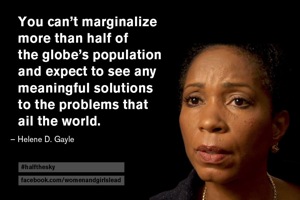
This one requires just a bit of context, so let me to set the stage for you.
Ed Brayton (Dispatches from the Culture Wars) wrote a post last month in which he scolded
Al Stefanelli for a video criticizing the behavior of 4-5 bloggers on the Freethought Blogs (FtB) network. I am not planning to address the content of Brayton's post here, as I want to focus instead on a comment on his post left by
Greta Christina (Greta Christina's Blog). She posed what I consider to be a brilliant question that has helped to show me that I've been missing something important about the role of feminism in the atheist community, how we discuss it, and the ongoing controversy surrounding Freethought Blogs/Skepchick/Atheism+. I feel like my eyes have been opened, and I am kicking myself a bit for not fully realizing this on my own.
Greta Christina's Question
Greta's comment was in response to a reader who complained, "The treatment that anyone who isn't a feminist encounters down here is beyond reprehensible." Part of Greta's response included the following question:
How would you respond if someone said, “The treatment that anyone who’s a racist encounters down here is beyond reprehensible”? Or, “The treatment that anyone who’s a homophobe encounters down here is beyond reprehensible”?
Have you considered the possibility that you’re treated the way you are because not being a feminist is reprehensible?
I know that some of you may be tempted to dismiss this out of hand. Please do not be so hasty. I think she's on to something important here.








 This one requires just a bit of context, so let me to set the stage for you. Ed Brayton (Dispatches from the Culture Wars) wrote a post last month in which he scolded Al Stefanelli for a video criticizing the behavior of 4-5 bloggers on the Freethought Blogs (FtB) network. I am not planning to address the content of Brayton's post here, as I want to focus instead on a comment on his post left by Greta Christina (Greta Christina's Blog). She posed what I consider to be a brilliant question that has helped to show me that I've been missing something important about the role of feminism in the atheist community, how we discuss it, and the ongoing controversy surrounding Freethought Blogs/Skepchick/Atheism+. I feel like my eyes have been opened, and I am kicking myself a bit for not fully realizing this on my own.
This one requires just a bit of context, so let me to set the stage for you. Ed Brayton (Dispatches from the Culture Wars) wrote a post last month in which he scolded Al Stefanelli for a video criticizing the behavior of 4-5 bloggers on the Freethought Blogs (FtB) network. I am not planning to address the content of Brayton's post here, as I want to focus instead on a comment on his post left by Greta Christina (Greta Christina's Blog). She posed what I consider to be a brilliant question that has helped to show me that I've been missing something important about the role of feminism in the atheist community, how we discuss it, and the ongoing controversy surrounding Freethought Blogs/Skepchick/Atheism+. I feel like my eyes have been opened, and I am kicking myself a bit for not fully realizing this on my own.
